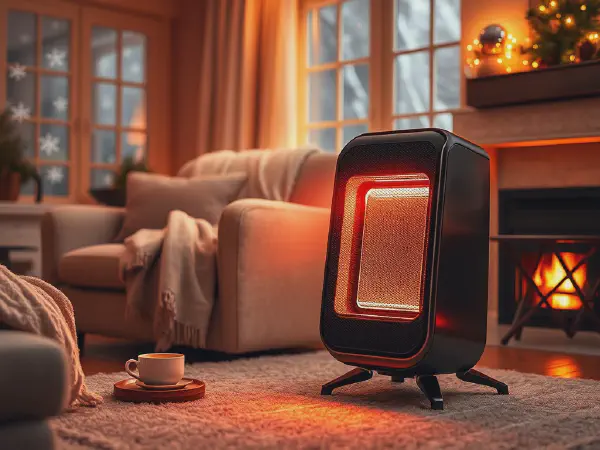The Ultimate Guide to Choosing a Space Heater

The Ultimate Guide to Space Heaters
As the cold weather approaches, staying warm becomes a top priority. One popular and efficient way to heat your home or office is by using a space heater. A space heater is a portable device that provides heat to a specific area, allowing you to stay comfortable without needing to heat the entire building. In this comprehensive guide, we will discuss everything you need to know about space heaters, including the different types, energy efficiency tips, safety precautions, benefits, and features to consider.
Types of Space Heaters
There are several types of space heaters available on the market, each with its own set of advantages. Understanding the different types can help you choose the best option for your specific needs.
For those chilly nights at the campsite, a space heater can make all the difference.
1. Fan-forced heaters: These heaters work by using a fan to circulate heated air throughout the room. They are known for their ability to quickly warm up a space and are ideal for rooms with poor insulation.
2. Radiant heaters: Radiant heaters use infrared radiation to warm objects and people directly. They are quiet and provide instant heat, making them suitable for personal use in small areas.
3. Oil-filled heaters: Oil-filled heaters are filled with diathermic oil, which is heated using an electric element. They provide long-lasting heat and are ideal for heating larger rooms.
4. Infrared heaters: Infrared heaters emit infrared radiation that heats objects and people directly, similar to the sun's warmth. They are energy-efficient and provide instant heat without drying out the air.
Energy Efficiency Tips
Using a space heater efficiently can help you save energy and reduce your heating costs. Here are some energy efficiency tips to keep in mind:
1. Selecting the right size heater: Choose a heater that is appropriate for the size of the room you want to heat. An oversized heater will consume excess energy, while an undersized heater will struggle to heat the space effectively.
2. Using a programmable thermostat: Invest in a space heater with a built-in programmable thermostat. This will allow you to set specific temperature schedules and ensure that the heater operates only when needed.
3. Insulating your space: Proper insulation can help retain the heat generated by the heater. Ensure that windows and doors are properly sealed, and consider using thermal curtains or insulation film.
4. Sealing drafts: Cold drafts can reduce the effectiveness of your space heater. Identify and seal any gaps or cracks in windows, doors, and walls to prevent heat loss.
Safety Precautions
Using a space heater requires careful attention to safety precautions to avoid accidents or fires. Here are some safety tips to follow:
1. Keeping the heater away from flammable materials: Ensure that the space heater is kept at least three feet away from any flammable materials such as curtains, furniture, or paper.
2. Placing the heater on a stable surface: Always place the heater on a flat, stable surface to prevent it from tipping over. Avoid placing it on carpets or uneven surfaces.
3. Using a heater with tip-over protection: Invest in a space heater that has a tip-over switch that automatically turns off the heater if it is accidentally knocked over.
4. Keeping the heater out of reach of children and pets: Make sure to place the space heater in a location where children and pets cannot accidentally touch or knock it over.
Benefits of Using a Space Heater
There are several benefits to using a space heater in your home or office:
1. Cost savings on energy bills: Space heaters allow you to heat specific areas rather than the whole building, resulting in significant energy savings.
2. Targeted heating in specific areas: With a space heater, you can direct the heat to the areas where it is needed the most, providing personalized comfort.
3. Portability and versatility: Space heaters are portable and can be easily moved from one room to another, allowing you to heat different areas as needed.
4. Supplemental heating in cold rooms: If you have a room that tends to be colder than the rest of the house, a space heater can provide additional warmth and comfort.
Features to Consider
When choosing a space heater, consider the following features to ensure you get the most out of your purchase:
1. Thermostatic control: Look for a heater that has a thermostat to maintain a consistent temperature in the room.
2. Timer function: A timer function allows you to set the heater to turn on or off at specific times, helping you save energy when the room is not in use.
3. Safety features: Check for features like overheat protection and cool-touch exteriors to prevent accidents and burns.
4. Portability: If you plan to move the heater frequently, choose a lightweight and compact model with built-in handles.
5. Noise level: Consider the noise level of the heater, especially if you plan to use it in a bedroom or quiet workspace.
6. Warranty: Look for a space heater that comes with a warranty to protect your investment.
